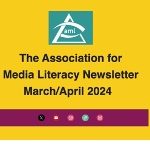Getting Started in Media Studies: The Issue of Knowledge and Control
Teachers give many reasons for dragging their feet when it comes to implementing the media strand in the English curriculum. Some feel that literature and literacy go hand in hand, and that the media is a lightweight area of investigation that and will not give students an opportunity to develop solid reading and writing skills. Others feel that they can’t take time from the important literary curriculum that should form the central cultural heritage of their students. “I’ll need at least three weeks to finish the Macbeth presentations, where am I going to find time for media this term?”
One of the most common early methods of bringing media into the English classroom was through the comparison between a novel or play and its movie version. Traditionally, the film could only be shown after the play or novel had been “properly” studied on the page. Showing the film was always enormously popular with students, but this activity was frequently left to student teachers, or even supply teachers. All too often, the assignment that accompanied the film encouraged students to note the shortcomings of the movie as a flawed recreation of the printed page: every scene that was changed or omitted could be seen as evidence of the movie’s superficiality. Thus, movies were merely dessert, but the printed texts were the meat and potatoes. Regrettably, this approach is still popular in many classrooms. In fact, some teachers will show the movie version of a text and provide no discussion or comparative assignment at all.
Teachers are often reluctant to admit it, but one of the most common reasons why many are hesitant to bring media work into their courses is their fear of appearing to know less than their students. In an English class, few students will challenge a teacher’s knowledge of a literary text, or her interpretation of a character, conflict or theme. Years of university study have given teachers vast stores of knowledge as well as the academic vocabulary to convince students that they know what they’re talking about. With this expert knowledge comes authority and control. The teacher’s opinion is respected, and her judgment of student ideas and interpretations is seldom challenged. Good teachers, of course, encourage their students to express their personal reactions to a text in light of their own backgrounds and situations – in accordance with reader response theory. However, good students are sensitive to their teachers’ own responses to texts and rarely express contrary points of view with any passion.
To do justice to the media, and acknowledge the range and importance of its influence in the lives of our students, we have to enter the world of popular culture where the students have the knowledge, the experience and the ability to manipulate the technology. To do this successfully and help students to develop critical insights into the media, we have to learn to relax and let go of the idea that our authority and control come only from expert knowledge. Even experienced and media savvy teachers who try to stay abreast of what’s new in television, music and other areas of popular culture, can’t hope to keep up with their students. And there’s no need to even try. The best approach is to let students take the lead: let them gather the information, sort it, analyze it and present it. The teacher’s main role is to provide categories for research, comparison and analysis.
Trying to keep up to date with the rapid evolution of media technology is an almost impossible task. By the time I had almost figured out how to program my own VCR so that I could leave the house and trust the machine to record the show I wanted, the DVD made video obsolete. Soon standard DVD will be a thing of the past, replaced by an upcoming high-density format, and we’ll all have to buy new players. My cell phone doesn’t even have a video screen and camera. I don’t know how to text message, but my students can do it in the classroom without me even being aware of it, half the time. Now they’re not only listening to music on their ipods through the entire school day, but watching full-length movies on them as well.
New and converging technologies create fascination for the young and offer endless
topics for the media classroom that are relevant to subject curriculum in many areas.
How does text-messaging change the way s that students communicate? Are new words and expressions emerging because of this format? How do these new technologies try to sell products and ideas to the people who use them? Are these new, miniaturized technologies circumventing the controls that schools once had over in-school advertising? Should laptop computers be allowed in school, considering the games, movies and sometimes pornographic content that students can load into them?
We don’t need to be experts on media topics to bring them into the classroom. Instead, we make the students explain them to us, and to each other using class discussion, followed by research and presentation projects built around a set of simple enquiry questions:
For example: Cell phones: group research and report topic
5 main questions
• Explain how cell phone technology has evolved over the past five years or so
• How do cell phones affect the ways in which students communicate / organize their
day to day lives? Compare to pre- cell phone times (ask your parents)
• Do new phone features cause new behaviors?
• What controls should schools / can schools place on cell phone use in school?
• What are the benefits as opposed to the dangers or disadvantages of cell phones?
Any media topic, whether content or technology focused, can be brought into the classroom in the above manner. Teachers can refine their enquiry questions
through discussion, and by drawing on their own experience, to focus on the critical issues that affect student behavior, attitudes and values. You don’t need to be an expert
to see that the media are changing rapidly as they attempt to reach different audiences in different ways, you just need to give students the opportunity to draw on their own knowledge and experience in a forum where they are exchanging ideas with their peers.



